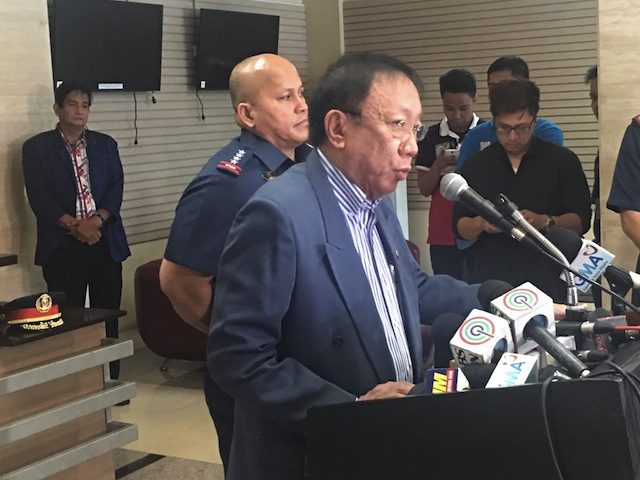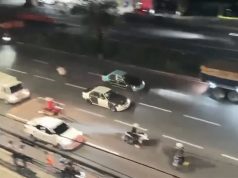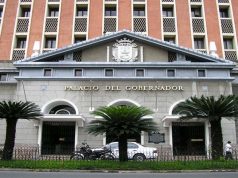MANILA – The Joint Venture Agreement between the Bureau of Corrections and the Tagum Agricultural Development Corporation – for which Speaker Pantaleon Alvarez had filed a graft case against erstwhile friend Rep. Antonio Floirendo Jr. – is void for going against the Constitution and the Public Land Act, the government’s top lawyer said Thursday.
Solicitor General Jose C. Calida’s declaration preceded the much-awaited release by the Department of Justice of its report on the deal, which Secretary Vitaliano Aguirre earlier ordered reviewed. This, after Alvarez filed a graft case against Floirendo Jr., the top campaign contributor of President Duterte in the May 2016 elections.
Alvarez subsequently requested the Office of the Solicitor General, as the government’s law office, to review the JVA between BUCOR and TADECO.
“The JVA entered into by BUCOR and TADECO is void as it goes against the Constitution and the Public Land Act,” Calida declared Thursday. According to Calida, the 5,212.46-hectare land within the DAPECOL subject of the JVA is land of the public domain. This means that the land belongs to the State.
“It should be emphasized that the Constitution only allows private corporations to hold lands of the public domain through lease for a total period not exceeding 50 years,” Calida said. “Assuming that the JVA is a lease, the initial agreement was entered into in 1969, extended for 25 years in 1979 and extended for another 25-year period in 2003. TADECO’s use and occupation of the DAPECOL lands should cease by 2019. The JVA cannot be allowed to last until 2029.”
‘Deal exceeds hectarage cap in Charter’
“The Constitution also provides that private corporations may only lease lands of the public domain not exceeding 1,000 hectares,” Calida said. He pointed out that the JVA covers 5,212.46 hectares, which is way more than what is allowed in the Constitution.
The solicitor general also said that the JVA violates Commonwealth Act No. 141 or the Public Land Act.
“Under the Public Land Act, agricultural public lands such as the DAPECOL may be disposed of only through homestead, sale, lease, or confirmation of imperfect title,” Calida explained. “It should be noted that BUCOR and TADECO entered into a Joint Venture Agreement. Clearly, a Joint Venture Agreement is not one of the modes by which agricultural public lands may be disposed of.”
Under the JVA, BUCOR is entitled to receive a “guaranteed annual production share” and a “share in the profits of TADECO.” In turn, BUCOR guaranteed TADECO “free and uninterrupted use” of DAPECOL’s land.
Violation of Public Land Act
“These stipulations clearly show that what TADECO and BUCOR entered into was not a lease, but a joint venture for the purpose of operating a banana plantation within DAPECOL,” Calida said. “This is a clear violation of the Public Land Act.”
“Assuming arguendo that the agreement falls under the definition of a lease under the Civil Code, the JVA would still be void because it failed to comply with the competitive bidding requirement under the Public Land Act,” Calida said. “The right to lease the DAPECOL land must be made through a public auction where bidders are required to submit sealed bids.”
The Bucor-Tadeco deal was first forged in the sixties and then renewed in 2003 when Floirendo Jr. was already in Congress.
Heir to Davao’s banana empire and, like Alvarez, a close friend of President Duterte, Floirendo Jr. had insisted he did not use his position as congressman when the JVA was renewed. In fact, he said, the JVA was so beneficial to government it had been used as a template for wise stewardship of government land assets.
In 1969, BUCOR and TADECO entered into a JVA, where BUCOR undertook to allocate areas within the DAPECOL for TADECO to develop into a banana plantation. Another JVA was entered into by the parties in 1979, whereby they agreed to extend the joint venture for 25 years. In 2003, the JVA was renewed for another 25-year period or until 2029. At that time, Floirendo Jr. was occupying a seat in Congress, which Alvarez alleged in his complaint was a violation of the anti-graft law because of ge conflict of interest.
Aguirre earlier told reporters the DOJ report would be out before Holy Week, but no report has been released yet. Aguirre is out of the country.










